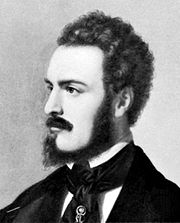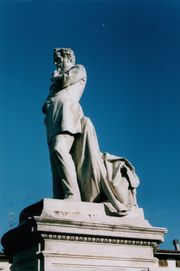
Giuseppe Giusti
Encyclopedia

Italy
Italy , officially the Italian Republic languages]] under the European Charter for Regional or Minority Languages. In each of these, Italy's official name is as follows:;;;;;;;;), is a unitary parliamentary republic in South-Central Europe. To the north it borders France, Switzerland, Austria and...
poet
Poet
A poet is a person who writes poetry. A poet's work can be literal, meaning that his work is derived from a specific event, or metaphorical, meaning that his work can take on many meanings and forms. Poets have existed since antiquity, in nearly all languages, and have produced works that vary...
.
Biography
Giusti was born at Monsummano TermeMonsummano Terme
Monsummano Terme is an comune located in the Province of Pistoia, Tuscany, central Italy. It is located in the Valdinievole, and is a popular spa resort....
, a small town of the Valdinievole
Valdinievole
Valdinievole or Val di Nievole ") is an area in the south-western part of the province of Pistoia, Tuscany, Italy. The saint Allucio of Campigliano was born to a wealthy, landed family in the Valdinievole and he ministered to the poor and travellers there.-Geography:The area is made up of 11...
, now in the province of Pistoia
Province of Pistoia
The Province of Pistoia is a province in the Tuscany region of Italy. Its capital is the city of Pistoia. It has an area of 965 km², and a total population of 268,503 . There are 22 communes in the province .-External links:...
.
His father, a cultivated and rich man, accustomed his son from childhood to study, and himself taught him, among other subjects, the first rudiments of music. Afterwards, in order to curb his too vivacious disposition, he placed the boy under the charge of a priest near the village, whose severity did perhaps more evil than good. At twelve Giusti was sent to school at Florence
Florence
Florence is the capital city of the Italian region of Tuscany and of the province of Florence. It is the most populous city in Tuscany, with approximately 370,000 inhabitants, expanding to over 1.5 million in the metropolitan area....
, and afterwards to Pistoia
Pistoia
Pistoia is a city and comune in the Tuscany region of Italy, the capital of a province of the same name, located about 30 km west and north of Florence and is crossed by the Ombrone Pistoiese, a tributary of the River Arno.-History:...
and to Lucca
Lucca
Lucca is a city and comune in Tuscany, central Italy, situated on the river Serchio in a fertile plainnear the Tyrrhenian Sea. It is the capital city of the Province of Lucca...
; and during those years he wrote his first verses. In 1826 he went to study law
Law
Law is a system of rules and guidelines which are enforced through social institutions to govern behavior, wherever possible. It shapes politics, economics and society in numerous ways and serves as a social mediator of relations between people. Contract law regulates everything from buying a bus...
at Pisa
Pisa
Pisa is a city in Tuscany, Central Italy, on the right bank of the mouth of the River Arno on the Tyrrhenian Sea. It is the capital city of the Province of Pisa...
; but, disliking the study, he spent eight years in the course, instead of the customary four. He lived gaily, however, though his father kept him short of money, and learned to know the world, seeing the vices of society, and the folly of certain laws and customs from which his country was suffering. The experience thus gained he turned to good account in the use he made of it in his satire.
His father had in the meantime changed his place of abode to Pescia; but Giuseppe did worse there, and in November 1832, his father having paid his debts, he returned to study at Pisa, seriously enamoured of a woman whom he could not marry, but now commencing to write in real' earnest in. behalf of his country. With the poem called La Ghigliottina (the guillotine
Guillotine
The guillotine is a device used for carrying out :executions by decapitation. It consists of a tall upright frame from which an angled blade is suspended. This blade is raised with a rope and then allowed to drop, severing the head from the body...
), Giusti began to strike out a path for himself, and thus revealed his' great genius. From this time he showed himself the Italian Béranger
Pierre-Jean de Béranger
Pierre-Jean de Béranger was a prolific French poet and chansonnier , who enjoyed great popularity and influence in France during his lifetime, but faded into obscurity in the decades following his death...
, and even surpassed the Frenchman in richness of language, refinement of humour and depth of satirical conception. In Béranger there is more feeling for what is needed for popular poetry. His poetry is less studied, its vivacity perhaps more boisterous, more spontaneous; but Giusti, in both manner and conception, is perhaps more elegant, more refined, more penetrating.
In 1834 Giusti, having at last entered the legal profession, left Pisa to go to Florence, nominally to practise with the advocate Capoquadri, but really to enjoy life in the capital of Tuscany. He fell seriously in love a second time, and as before was abandoned by his love. It was then he wrote his finest verses, by means of which, although his poetry was not yet collected in a volume, but for some years passed from hand to hand, his name gradually became famous. The greater part of his poems were published clandestinely at Lugano
Lugano
Lugano is a city of inhabitants in the city proper and a total of over 145,000 people in the agglomeration/city region, in the south of Switzerland, in the Italian-speaking canton of Ticino, which borders Italy...
, at no little risk, as the work was destined to undermine the Austria
Austria
Austria , officially the Republic of Austria , is a landlocked country of roughly 8.4 million people in Central Europe. It is bordered by the Czech Republic and Germany to the north, Slovakia and Hungary to the east, Slovenia and Italy to the south, and Switzerland and Liechtenstein to the...
n rule in Italy.

Bastia
Bastia is a commune in the Haute-Corse department of France located in the northeast of the island of Corsica at the base of Cap Corse. It is also the second-largest city in Corsica after Ajaccio and the capital of the department....
, Giusti thoroughly established his fame by his Gingillino, the best in moral tone as well as the most vigorous and effective of his poems. The poet sets himself to represent the vileness of the treasury officials, and the base means they used to conceal the necessities of the state. The Gingillino has all the character of a classic satire. When first issued in Tuscany, it struck all as too impassioned and personal. Giusti entered heart and soul into the political movements of 1847 and 1848, served in the national guard, sat in the parliament for Tuscany; but finding that there was more talk than action, that to the tyranny of princes had succeeded the tyranny of demagogues, he began to fear, and to express the fear, that for Italy evil rather than good had resulted. He fell, in. consequence, from the high position. he had held in public estimation, and in 1848 was regarded as a reactionary. His friendship for the marquis Gino Capponi
Gino Capponi
Marquis Gino Capponi was an Italian statesman and historian.The Capponi family is one of the most illustrious Florentine houses, and is mentioned as early as 1250; it acquired great wealth as a mercantile and banking firm, and many of its members distinguished themselves in the service of the...
, who had taken him into his house during the last years of his life, and who published after Giusti's death a volume of illustrated proverbs, was enough to compromise him in the eyes of such men as Guerrazzi
Francesco Domenico Guerrazzi
Francesco Domenico Guerrazzi was an Italian writer and politician involved in the Italian risorgimento.-Biography:...
, Montanelli
Giuseppe Montanelli
Giuseppe Montanelli was an Italian statesman and author.- Biography :Montanelli was born at Fucecchio, then part of the Grand Duchy of Tuscany, and in 1840 was appointed law professor at Pisa....
and Niccolini. On 31 May 1850 he died at Florence in the palace of his friend.
The poetry of Giusti, under a light trivial aspect, has a lofty civilizing significance. The type of his satire is entirely original, and it had also the great merit of appearing at the right moment, of wounding judiciously, of sustaining the part of the comedy that "castigat ridendo mores." Hence his verse, apparently jovial, was received by the scholars and politicians of Italy in all seriousness. Alexander Manzoni in some of his letters showed a hearty admiration of the genius of Giusti; and the weak Austrian and Bourbon
House of Bourbon
The House of Bourbon is a European royal house, a branch of the Capetian dynasty . Bourbon kings first ruled Navarre and France in the 16th century. By the 18th century, members of the Bourbon dynasty also held thrones in Spain, Naples, Sicily, and Parma...
governments regarded them as of the gravest importance.
His poems have often been reprinted, the best editions being those of Le Monnier, Carducci
Giosuè Carducci
Giosuè Alessandro Michele Carducci was an Italian poet and teacher. He was very influential and was regarded as the official national poet of modern Italy. In 1906 he became the first Italian to win the Nobel Prize in Literature.-Biography:...
(1859; 3rd ed., 1879), Fioretti (1876) and Bragi (1890). Besides the poems and the proverbs already mentioned, we have a volume of select letters, full of vigour and written in the best Tuscan language, and a fine critical discourse on Giuseppe Parini
Giuseppe Parini
Giuseppe Parini was an Italian Enlightenment satirist and poet of the neoclassic period.-Biography:Parini was born in Bosisio in Brianza, Lombardy...
, the satirical poet. In some of his compositions the elegiac rather than the satirical poet is seen. Many of his verses have been excellently translated into German by Paul Heyse. Good English translations were published in the Athenaeum by Mrs TA Trollope, and some by WD Howells
William Dean Howells
William Dean Howells was an American realist author and literary critic. Nicknamed "The Dean of American Letters", he was particularly known for his tenure as editor of the Atlantic Monthly as well as his own writings, including the Christmas story "Christmas Every Day" and the novel The Rise of...
are in his Modern Italian Poets (1887).
A life of Giusti was written in English and published not long after his death by Susan Horner, "The Tuscan Poet Giuseppe Giusti, and his times" [Macmillan and Co, 1864].

